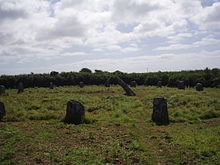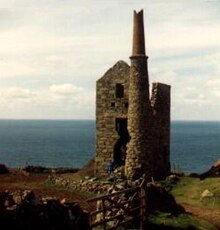
Back Història de Cornualla Catalan Hanes Cernyw Welsh Կոռնուոլի պատմություն Armenian Sejarah Cornwall ID Storia della Cornovaglia Italian Istori Kernow KW Historia Kornwalii Polish 康瓦爾歷史 Chinese
| History of Cornwall |
|---|
 |
|
|



The history of Cornwall goes back to the Paleolithic, but in this period Cornwall only had sporadic visits by groups of humans. Continuous occupation started around 10,000 years ago after the end of the last ice age. When recorded history started in the first century BCE, the spoken language was Common Brittonic, and that would develop into Southwestern Brittonic and then the Cornish language. Cornwall was part of the territory of the tribe of the Dumnonii that included modern-day Devon and parts of Somerset. After a period of Roman rule, Cornwall reverted to rule by independent Romano-British leaders and continued to have a close relationship with Brittany and Wales as well as southern Ireland, which neighboured across the Celtic Sea. After the collapse of Dumnonia, the remaining territory of Cornwall came into conflict with neighbouring Wessex.
By the middle of the ninth century, Cornwall had fallen under the control of Wessex, but it kept its own culture. In 1337, the title Duke of Cornwall was created by the English monarchy, to be held by the king's eldest son and heir. Cornwall, along with the neighbouring county of Devon, maintained Stannary institutions that granted some local control over its most important product, tin, but by the time of Henry VIII most vestiges of Cornish autonomy had been removed as England became an increasingly centralised state under the Tudor dynasty. Conflicts with the centre took place with the Cornish Rebellion of 1497 and Prayer Book Rebellion of 1549.
By the end of the 18th century, Cornwall was administered as an integral part of the Kingdom of Great Britain along with the rest of England and the Cornish language had gone into steep decline. The Industrial Revolution brought huge change to Cornwall, as well as the adoption of Methodism among the general populace, turning the area nonconformist. Decline of mining in Cornwall resulted in mass emigration overseas and the Cornish diaspora, as well as the start of the Celtic Revival and Cornish revival which resulted in the beginnings of Cornish nationalism in the late 20th century.
Cornwall's Early Medieval history, in particular the early Welsh and Breton references to a Cornish King named Arthur, have featured in such legendary works as Geoffrey of Monmouth's Historia Regum Britanniae, predating the Arthurian legends of the Matter of Britain (see the list of legendary rulers of Cornwall).